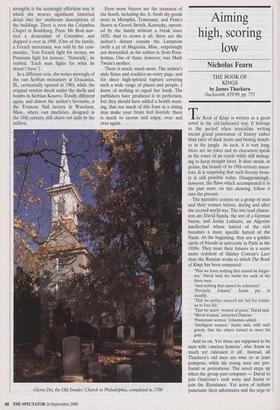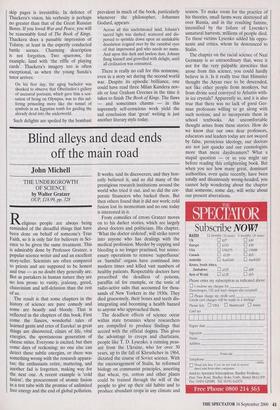Aiming high, scoring low
Nicholas Fearn
THE BOOK OF KINGS by James Thackara Duckworth, £19.99, pp. 773 The Book of Kings is written as a great novel in the old-fashioned way. It belongs to the period when masculine writing meant grand panoramas of history rather than tales of duck hunts and boxing match- es in the jungle. As such, it is very long, there are no jokes and its characters speak in the tones of an oracle while still manag- ing to keep straight faces. It does attain, at points, the beauty of its 19th-century ances- tors. It is surprising that such literary beau- ty is still possible today. Disappointingly, however, the flaws which accompanied it in the past must, on this showing, follow it into the present.
The narrative centres on a group of men and their women before, during and after the second world war. The two lead charac- ters are David Sunda, the son of a German baron, and Justin Lothaire, an Algerian intellectual whose hatred of the rich becomes a more specific hatred of the Nazis. At the beginning, they are a golden circle of friends at university in Paris in the 1930s. They toast their futures in a scene more redolent of Shirley Conran's Lace than the Russian works to which The Book of Kings has been compared:
`That we learn nothing that cannot be forgot- ten.' David held the bottle for each of the three men.
`And nothing that cannot be relearned.' `Precisely, Johann!' Justin put in steadily.
`That we neither succeed nor fail but contin- ue to love life.'
`That we marry 'women of grace,' David said. `Moral women,' corrected Duncan.
`Passionate women,' Johannes added. `Intelligent women,' Justin said, with such gravity that the others turned to meet his gaze.
And so on. Yet these are supposed to be men with 'careless humour', who 'knew so much yet ridiculed it all'. Instead, all Thackera's old men are wise or at least pompous, while his young men are pro- found or pretentious. The novel steps up when the group part company — David to join Guderian's tank army and Justin to join the Resistance. Yet acres of tedium punctuate their adventures and the urge to skip pages is irresistible. In defence of Thackera's vision, his verbosity is perhaps no greater than that of the Great Russian Bores. If you loved War and Peace, you will be reasonably fond of The Book of Kings. Thackera does a passable impression of Tolstoy, at least in the expertly conducted battle scenes. Charming description is not forgotten. Two sparrows, for example, land with 'the riffle of playing cards'. Thackera's imagery too is often exceptional, as when the young Sunda's tutor arrives:
On his first day, the aging bachelor was shocked to observe that Oberlinden's gallery of ancestral portraits, which gave him a sen- sation of being on Olympus, was to this suf- fering princeling more like the tunnel of symbols in an Egyptian tomb for guiding the already dead into the underworld.
Such delights are spoiled by the bombast
prevalent in much of the book, particularly whenever the philosopher, Johannes Godard, appears:
Across all this unchristened land, Johann's sacred light was dashed, scattered and dis- persed to sprinkle down upon an unslakable desolation reigned over by the cannibal eyes of that impersonal god who needs no name. And upon this dark and lawless dust, Johann flung himself and grovelled with delight, until all civilisation was consumed.
There is really no call for this nonsense, even in a story set during the second world war. Despite its episodic brilliance, one could have read three Milan Kundera nov- els or four Graham Greenes in the time it takes to finish The Book of Kings. The flaws — and sometimes chasms — in this supremely self-conscious work yield the sad conclusion that 'great' writing is just another literary style today.



































































 Previous page
Previous page